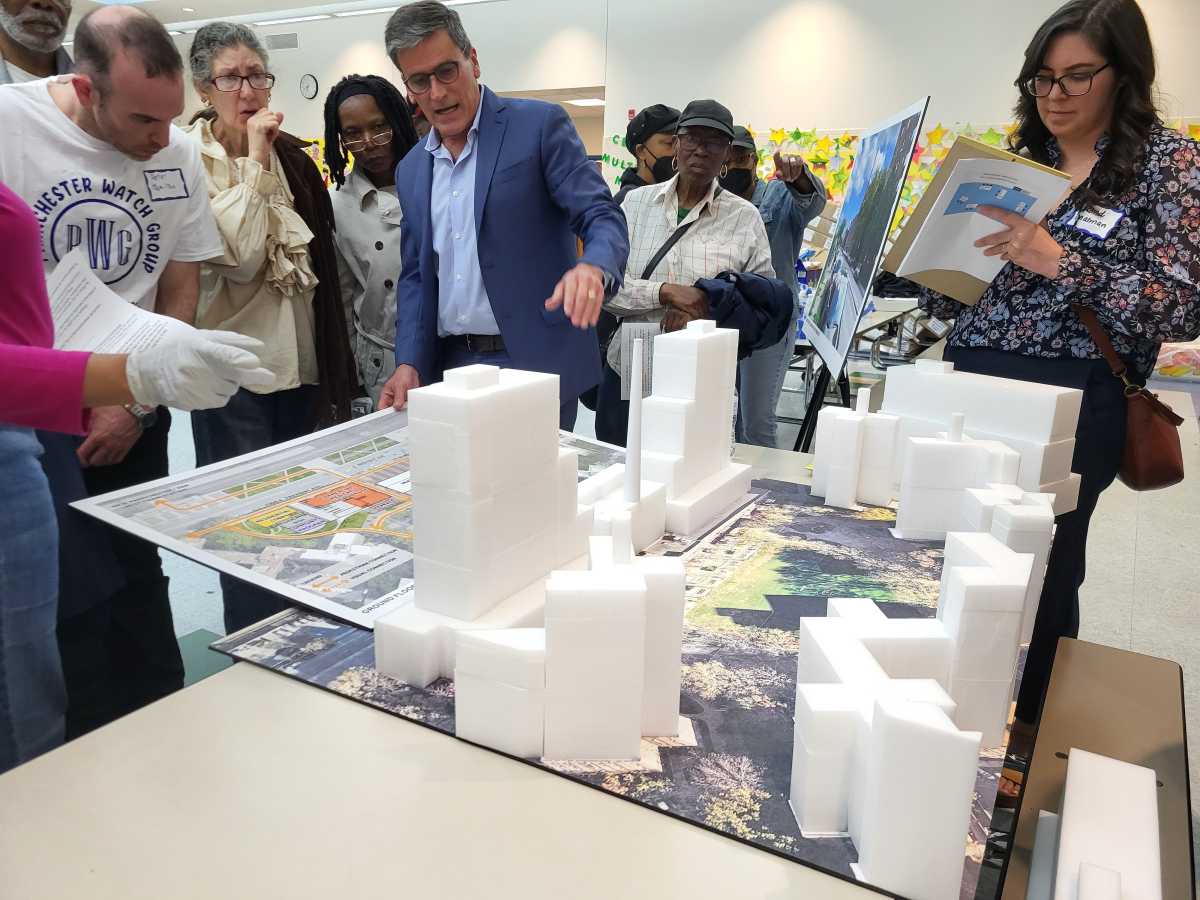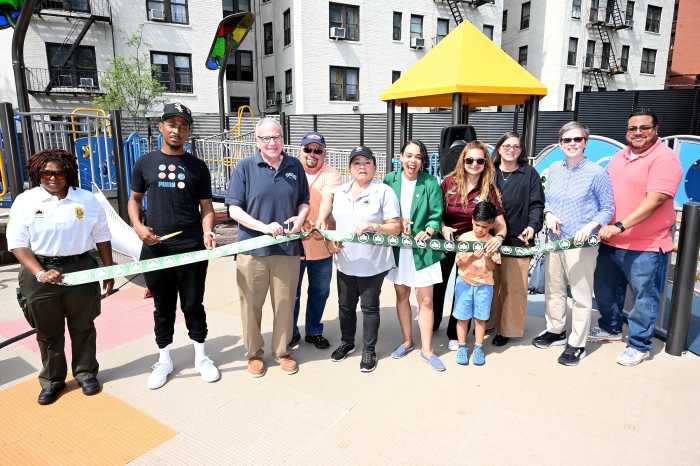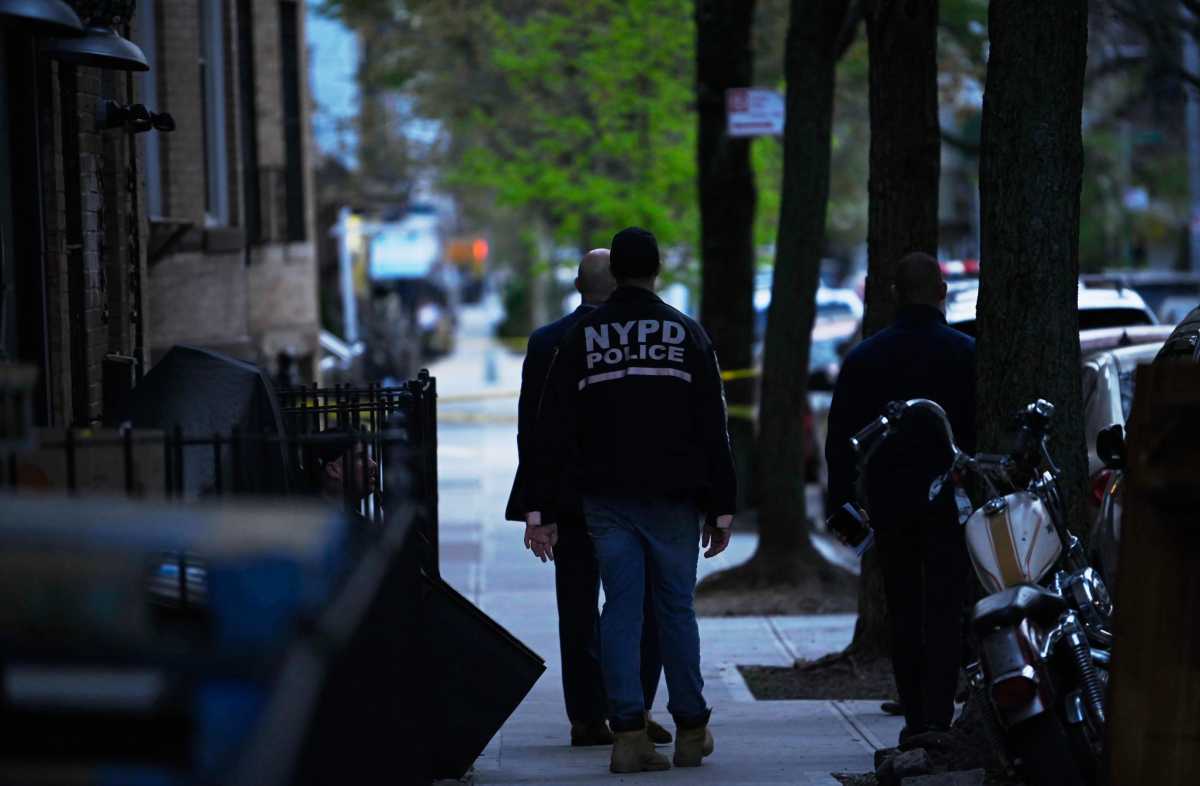On May 2, Parkchester residents had the opportunity to see firsthand the residential zoning changes that might accompany the Metro-North megaproject.
Dozens of Parkchester neighbors came to the cafeteria at P.S. 106 — many arriving well ahead of time and lining up at the door — on a warm evening for an open house sponsored by Council Member Amanda Farías, whose district includes Parkchester.
Attendees were able to learn more about the massive Metro-North proposal, which would add new train stations, along with expanded commercial and public space, to the East Bronx neighborhoods of Parkchester, Morris Park, Co-Op City and Hunts Point.
The plan also calls for about 7,500 housing units in Morris Park and Parkchester. While the train stations themselves have been met with little controversy, the plans for surrounding housing and retail — and the zoning changes that would accompany them — have been more of a sticking point with some East Bronxites.
At tables throughout the room, residents met directly with council staffers and the developers of two proposed sites along East Tremont Avenue. Developers from Pinnacle and the Parkchester Preservation Corporation brought mock-ups and models to demonstrate the possibilities for what could be built at the sites — and what trade-offs might be involved.
Farías told the Bronx Times she planned the May 2 event in an “intentional and deliberate” way that provided a “one-of-a-kind opportunity” for residents to view some of the proposed plans straight from the developers in charge of certain sites.
Farías said she wanted to get a better sense of residents’ priorities. She sought feedback as to whether residents are ok with more building height in exchange for more ground-level amenities. Additionally, she wanted to know whether East Bronxites prioritize lower buildings over increased housing density.
Residents at the open house were eager to have their say.
Gloria Overstreet, who moved to Parkchester in 1980, told the Bronx Times that she likes the Metro-North proposal but wants it to bring more amenities to the neighborhood. She said she wants a better supermarket (specifically a Whole Foods), along with a community center, better restaurants and more ramps than steps.
But Overstreet also said she hopes that living conditions will improve for people already in the neighborhood. Maintenance and repairs seem to be concentrated more on the outside of buildings rather than inside the condos, she said.
“I like living here, but a lot of things are not attentive to tenants,” she said. “In the time I’ve been here, I’ve seen [living conditions] go down.”
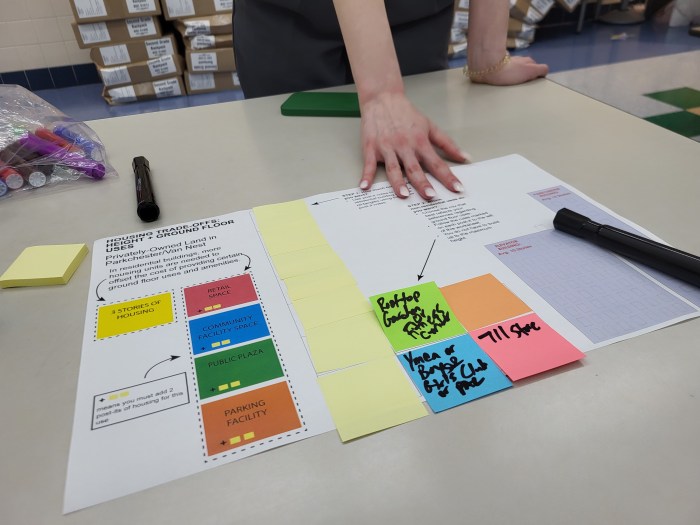
While it may be impossible to strike a perfect balance, Farías’ event aimed to generate honest feedback from constituents. Staffers took notes around the room, and Farías said she would bring their input to the negotiation table when the proposal reaches the City Council for a binding vote, expected by late summer. The votes by Farías and other Bronx council members who represent the project area will likely hold influence since the council typically votes in accordance with the members who serve the affected districts.
The borough’s community boards most affected by the project have already submitted their advisory votes to the Department of City Planning.
Community Board 9, which includes Parkchester, has voted in support of the project — and specifically voiced approval for increased housing density and building height that could accompany it.
CB 11 also voted in support — but CB 10, which includes Co-Op City, voted no, citing concerns about infrastructure, parking and building height. Co-Op City and Hunts Point would not receive new housing from the proposed Metro-North project but would see development in terms of retail and public spaces.
In addition, the Borough Board — which consists of the Borough President, chairpersons of community boards within project boundaries and all Bronx City Council members — also recently voted to support the project, according to the Department of City Planning.
But there is still plenty of time for residents’ views to be heard. Farías said she wants “a million meetings” to engage as many people as possible, especially those who aren’t active with their community board.
Votes by the community boards and Borough Board are advisory as the plan continues through the public input process. By the end of summer, it is expected to be put to a vote by the City Planning Commission, then head to the City Council, and finally, the mayor’s office.
If residential rezoning for the Metro-North megaproject is approved, Parkchester would be among the neighborhoods to see the most change.
In addition to the new stations, the Morris Park and Parkchester neighborhoods would add about 7,500 housing units over time — which involves significant zoning changes in those areas.
Some residents remain skeptical that existing or future infrastructure would support the proposed changes. A few conversations with developers at the May 2 open house became contentious.
“This is all a done deal no matter what we say,” the Bronx Times overheard one resident claim at the table manned by the Parkchester Preservation Corporation, which proposes increased building height along East Tremont to accommodate more housing, parking and retail space. The resident said their plan might bring “better parking — in ten years.”
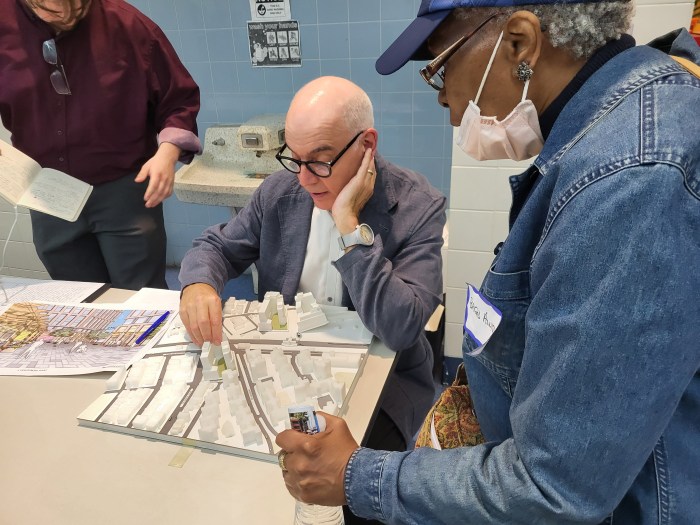
Bringing any change to Parkchester’s unique character is likely to stir up controversy. The neighborhood is unique as the country’s first planned community of middle-income housing, built in 1939 by the Metropolitan Life Insurance Company. The area had previously been home to a Catholic residence for abandoned children.
Parkchester, which essentially consists of a massive housing complex, started to decline in the 1960s and 70s as the city fell into fiscal crisis. Met Life later sold it to developers, and by the mid-1990s, Parkchester began to fall into a state of disrepair, with numerous vacancies and decreased investment values.
With the neighborhood in crisis, the nonprofit Community Preservation Corporation partnered with real estate firms to create the Parkchester Preservation Corporation, which purchased and renovated many apartments and public spaces.
Today, most residents say that the neighborhood has a consistent look and feel but are wary that the area could undergo significant change with the proposed rezoning. The red brick condo buildings max out at 13 stories, and the neighborhood centers around the landscaped Metropolitan Oval, a small park with a stone fountain that serves as a gathering and event space for residents.
As Parkchester residents grapple with the tension between modern development and historic preservation, Farías’ open house was all about understanding trade-offs.
Meanwhile, the city has said the proposed rezoning and Metro-North plans are designed to be in keeping with each neighborhood’s unique character. The developer Parkchester Preservation Corporation is also trying to convey that message — distributing a flyer at the meeting that said the project “continues its history of preserving and supplying moderate income and workforce housing” and “maintains a sense of scale within existing context.”
The Department of City Planning, the Borough President’s office and other agencies have held numerous presentations and meetings as the plan has already gone through five years of public input.
One of the proposal’s main objectives is “Planning for growth while celebrating who we are,” according to the DCP website.
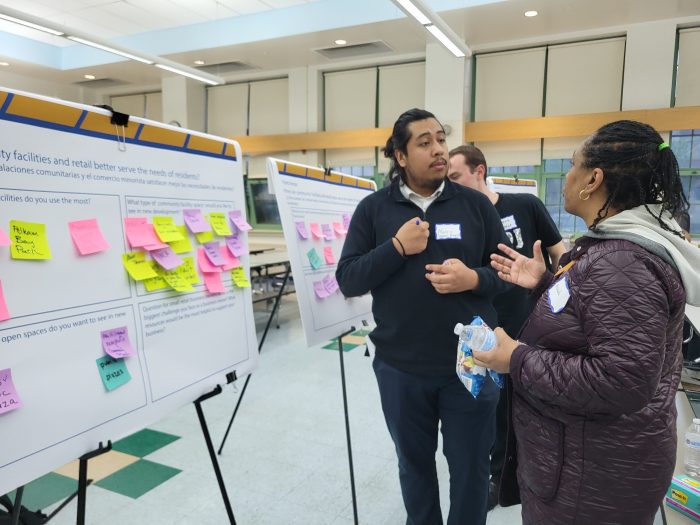
Peter Hamilton with the Parkchester Watch Group, who attended the May 2 meeting, said he would enjoy using Metro-North to go into midtown on weekends — but attention should first focus on improvements for those already in the neighborhood.
According to Hamilton, the group was founded in 2020 to help residents deal with issues in the condos that they felt were being addressed too slowly by management —or ignored altogether. He cited water leaks and unreliable elevators as just some of the issues he sees in the aging buildings.
Given Parkchester’s unique history, the Metro-North project requires special considerations, said Hamilton, and the group feels that agencies and developers are not hearing their concerns.
The Bronx Times left a voicemail with the Parkchester Preservation Corporation but has yet to receive comment.
At the open house, Hamilton distributed a flyer outlining the group’s main concerns with the proposed rezoning: school overcrowding, crime, traffic congestion, building height, and, of course, parking. He also voiced concern about the affordability of new housing.
The Parkchester Watch Group wants a new school, a greater police presence, a parking structure, security cameras and other infrastructure to support an increase of residents and commuters. And when it comes to parking, Hamilton said, the city has told them that parking is not included nor excluded from the proposed rezoning — which has created “uncertainty” among residents, he said.
Given the city’s push to decrease New Yorkers’ car dependence — including implementation of major measures such as congestion pricing — “We feel DCP is not taking our parking concerns seriously,” said Hamilton.
With the numerous changes accompanying the Metro-North project, residents are being urged to state their priorities. And as Farías said, the May 2 meeting was just one of many opportunities for Parkchester residents to have their say on the complicated issue.
“It’s a lot to digest,” said Hamilton. And as for the open house, “I hope the input is taken to heart and actually implemented.”
Reach Emily Swanson at eswanson@schnepsmedia.com or (646) 717-0015. For more coverage, follow us on Twitter, Facebook and Instagram @bronxtimes

